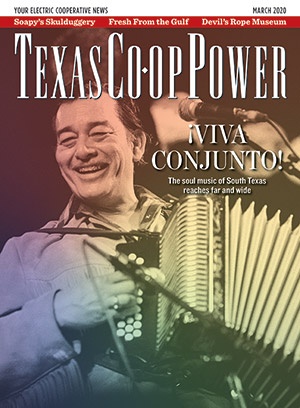Though his legend is most associated with skulduggery in Colorado and Alaska, Soapy Smith spent his teenage years in Round Rock and began his career as a swindler in Fort Worth.
Before he was Soapy Smith, he was Jefferson Randolph Smith II, son of a wealthy Georgia family that lost everything after the Civil War and moved to Round Rock in 1876. Smith and a cousin reportedly witnessed the shoot-out there that killed outlaw Sam Bass in 1878. But the crime-doesn’t-pay lesson inherent in the Bass incident was apparently lost on Smith: His two years in Round Rock were his last as a law-abiding citizen.
Jefferson Smith morphed into Soapy Smith following his most famous swindle, the “Prize Package Soap Sell.” He’d set up a display featuring bars of soap on a street corner, establish a friendly patter with passersby and then wrap some of the soap with paper money. He then rewrapped the bars in plain paper, mixed them in with the others and sold them for 50 cents—about $12 in today’s money.
Someone—a ringer—always bought a bar of soap, unwrapped it and found money. The excitement spread to passers-by who took the bait and bought up the whole pile of soap. Only Smith cohorts ever bought a bar with money. He ran this swindle for decades.
Fort Worth was Smith’s first operational base. He assembled a skilled gang, and they pooled their money, paid off cops and bribed politicians to overlook their nefarious activity. Jeff Smith V, Smith’s great-grandson and biographer, wrote that Soapy’s particular gift was organization.
“Alone, these men were forced to be drifters, moving from one town to the next, as Jefferson had done,” Jeff Smith wrote. “Jefferson united the men, and together as an organization, they were almost unstoppable. … In the late 1870s Jeff became so powerful and known for his crimes that laws were enacted at Fort Worth especially due to him. It was time for Jeff to move on.”
Though the gang opted for Denver and points north, Smith maintained contact with Texans for the rest of his life. His younger brother, Bascom, was arrested in 1883, when he was 14, for trying to set fire to a Belton hotel, and two sisters lived in Bell County.
Smith’s reputation as King of the Frontier Con Men prompted him to seek dishonest work beyond Colorado. He traveled to Skagway, Alaska, gateway to the Klondike gold fields.
In Skagway, citizens formed a vigilance committee to run Smith and his confederates out of town. Smith responded by announcing his own committee to run the original committee out of town.
The tipping point came when a theft of $2,000 was pinned on a Smith associate, and Smith wouldn’t give up the robber or return the money. A group met at the Juneau Wharf on July 8, 1898, to discuss their next move. An armed and intoxicated Smith confronted the meeting. His enemies claimed his last words were, “My God, don’t shoot!”
Twenty years to the month after Sam Bass was gunned down in Round Rock, Soapy Smith met the same fate in Alaska.
Clay Coppedge, a member of Bartlett EC, lives near Walburg.


